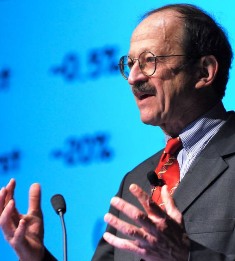Health should be pillar of foreign policy
November / December 2008 | Volume 7, Issue 6

Dr. Harold Varmus
Former NIH Director Dr. Harold Varmus says Congress ought to double the amount of money spent on global health and highlight it "as pillar of U.S. foreign policy."
Delivering the annual David E. Barmes lecture that Fogarty cosponsors with the National Institute of Dental and Craniofacial Research, Varmus also said the research portfolio should be rebalanced with some of the increase directed toward chronic and neglected diseases, maternal and child health, and other issues.
"The number of dollars we are talking about here in the greater sphere of things is trivial," he said. "When we are talking about a trillion-dollar economic stimulus package...coming up with 10 or 20 billion more to do something that affects the state of health throughout the world, to me that just seems like a matter of resolve, and we ought to resolve to do these things."
Varmus is co-chair of an Institute of Medicine committee that the day before had released a set of recommendations to the Obama administration, calling for a doubling of federal aid for global health to $15 billion in four years, for health-related Millennium Development Goals like AIDS and other infectious diseases as well as for noncommunicable diseases and injury prevention.
Noting that much of the world blames the United States for the world's economic crisis, Varmus said, "Our reputation depends on exerting humanitarian leadership. If we can continue printing money for automakers, we ought to do it for global health as well."
The IOM report was based on extensive public hearings and timed to coincide with the presidential transition. It is the first part of a follow-up to a 1997 report on the subject. The rest is due in several months, covering the role of nongovernmental institutions.
In the new report's central recommendation, "The committee is calling on the next president to highlight health as a pillar of U.S. foreign policy," perhaps by making a major speech early in his tenure declaring an American responsibility and opportunity to contribute to improved health around the world.
It also urged President-elect Obama to appoint a coordinator to his personal staff to oversee government's global health initiatives, possibly under aegis of the National Security Council.
The committee singled out Fogarty as a success story for having "played a pivotal role in building the capacity of researchers in low- and middle-income countries," citing the AIDS International Training and Research Program and the new Millennium Promise Awards to build research capacity in low- and middle-income countries in fields related to chronic diseases.
Varmus and Fogarty Director Dr. Roger I. Glass noted that since the 1997 report the outlook for global health has changed dramatically.
"We've seen enormous changes--huge investments in global health from both the private and public sectors," Glass said. "We've witnessed a shift in approach as well--with a growing recognition of the role global health can play in diplomacy and economic development."
Polls have shown that health now ranks among Americans' top priorities for development assistance, said the committee, whose work was sponsored by four government agencies, including NIH, and five private foundations. Sixteen Institutes and Centers joined Fogarty in supporting the effort.
While the committee did not shy from calling for more funding, it stressed responsible spending, declaring, "Congress and the administration should require that aid be accompanied by rigorous country- and program-level evaluations to measure the impact of global health investments in order to maximize their effectiveness."
Although it praised of the work of the World Health Organization, the committee called for a "rigorous external review" of the U.N. agency to improve its structural and functional effectiveness.
Varmus, co-recipient of a Nobel Prize for studies of the genetic basis of cancer, is president of Memorial Sloan-Kettering Cancer Center. The lecture honors the late David E. Barmes, a special expert for international health at the NIDCR.
More Information
To view Adobe PDF files,
download current, free accessible plug-ins from Adobe's website.